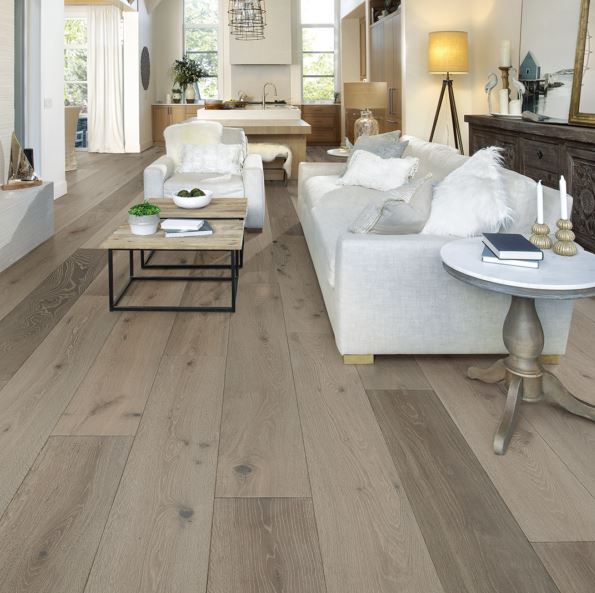In today’s world, where sustainability is becoming increasingly important, many homeowners are seeking environmentally responsible alternatives for home improvement projects. Flooring is one area where eco-friendly choices can make a significant difference. Wooden flooring, known for its timeless beauty and durability, can also be a sustainable option when chosen carefully. Let’s explore the eco-friendly Wooden flooring Dubai choices available, their benefits, and how they contribute to a greener home.
Reclaimed Wood: Giving New Life to Old Timber
One of the most sustainable choices for wooden flooring is reclaimed wood. As the name suggests, reclaimed wood is sourced from old buildings, barns, warehouses, and other structures that are being torn down or renovated. Instead of using new timber, which can contribute to deforestation, reclaimed wood gives new life to materials that would otherwise be discarded.
Not only is this an eco-friendly option, but it also adds unique character to your home. Reclaimed wood often has a rich history, with visible imperfections and weathered finishes that make each piece one-of-a-kind. Plus, choosing reclaimed wood reduces the demand for newly harvested trees, helping to protect forests and wildlife habitats.
When selecting reclaimed wood, look for suppliers who ensure the material is properly treated and inspected for quality, as safety is crucial in this type of flooring.
Bamboo Flooring: Fast-Growing and Renewable
While technically a grass rather than wood, bamboo is one of the most eco-friendly flooring options available. Bamboo grows at an incredibly fast rate—up to 3 feet per day—and can be harvested every 3-5 years, making it a highly renewable resource. Unlike hardwood trees that take decades to mature, bamboo can be harvested quickly without causing long-term environmental harm.
Bamboo flooring is also durable, moisture-resistant, and easy to maintain, making it a popular choice for many homeowners. It is available in a variety of styles, from light natural tones to darker stains, and can be a suitable option for almost any room in your home. When purchasing bamboo flooring, ensure it is FSC-certified (Forest Stewardship Council), which guarantees it has been harvested sustainably.
Cork Flooring: Renewable and Comfortable
Cork flooring is another eco-friendly option that deserves attention. Cork is made from the bark of cork oak trees, which naturally regenerate after harvesting. This means that cork can be collected without harming the tree, making it a renewable resource.
Cork floors are not only environmentally friendly but also offer excellent comfort underfoot. The material is naturally soft and cushiony, which makes it ideal for spaces where you stand for long periods, such as kitchens or home offices. Additionally, cork is an excellent insulator, providing both sound and temperature insulation, which can contribute to energy efficiency in your home.
Another benefit of cork flooring is its biodegradability. At the end of its life cycle, cork can break down naturally, unlike synthetic flooring materials that can take hundreds of years to decompose.
Sustainably Sourced Hardwood: Look for Certifications
If you prefer traditional hardwood flooring, you can still make an eco-friendly choice by opting for wood that is sustainably sourced. Look for products with certifications like the Forest Stewardship Council (FSC) or Programme for the Endorsement of Forest Certification (PEFC). These organizations ensure that the wood is harvested responsibly, with minimal environmental impact, and that workers are treated fairly.
Sustainable hardwood options include oak, maple, cherry, and walnut. Not only do these hardwoods come from well-managed forests, but they also offer long-lasting durability, meaning they won’t need to be replaced as often, which further reduces their environmental footprint.
When considering hardwood flooring, take into account the lifecycle of the product. Some hardwood floors are engineered, meaning layers of wood are laminated together. These can be more sustainable than solid wood floors since they use smaller amounts of raw material but still provide the aesthetic and durability of hardwood.
Non-Toxic Finishes: Protecting Your Home and the Planet
The environmental impact of wooden flooring isn’t just about the wood itself; it’s also about the finishes and treatments applied to the surface. Traditional floor finishes can contain harmful chemicals that release volatile organic compounds (VOCs) into the air, which can negatively impact indoor air quality.
To make your wooden floors even more eco-friendly, choose finishes that are low in VOCs or, better yet, go for non-toxic, water-based finishes. These options are much safer for both the environment and your health, as they don’t release harmful fumes during application or over time. Some natural oil and wax finishes are also available, providing a more sustainable way to protect your floors without the use of harsh chemicals.
The Longevity Factor: Why Durability Matters
Sustainability is not just about the sourcing of materials; it’s also about the longevity of the product. One of the key benefits of wooden flooring, in general, is its durability. High-quality wood floors can last for decades with proper care, reducing the need for replacements and minimizing waste.
Additionally, wooden floors can be refinished multiple times, extending their lifespan. This makes wooden flooring a long-term investment that contributes to sustainability, as you won’t need to replace it every few years like some other flooring types. The ability to restore wooden floors also means less waste and fewer materials being disposed of in landfills.
Conclusion: Sustainable Choices for a Greener Home
Choosing sustainable wooden Flooring Dubai is an effective way to reduce your home’s environmental impact while enhancing its beauty and value. Whether you opt for reclaimed wood, bamboo, cork, or sustainably sourced hardwood, you can enjoy the natural charm of wooden floors without compromising the planet. By selecting eco-friendly finishes and focusing on durability, you can ensure your wooden floors remain an asset for years to come.
As the demand for sustainable products grows, more eco-conscious options will continue to emerge, giving homeowners even more choices for creating a greener, more sustainable home. So, the next time you consider updating your flooring, remember that the beauty of wood doesn’t have to come at the expense of the environment.



